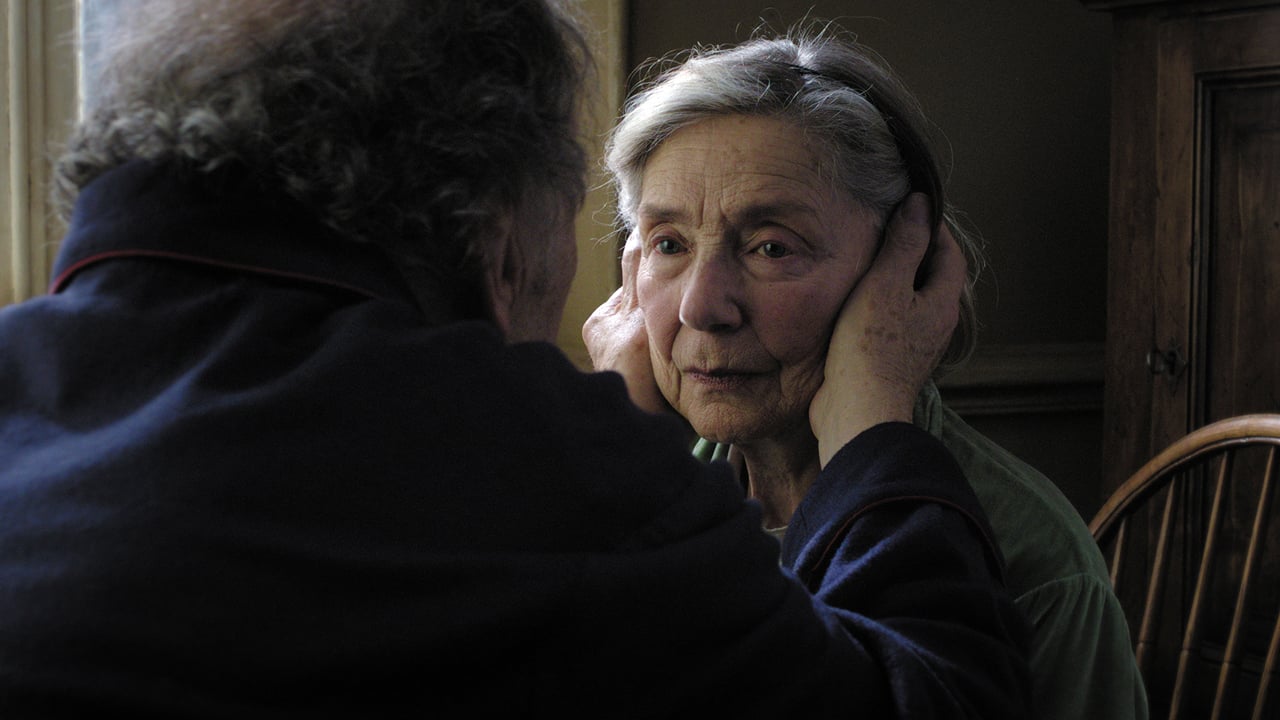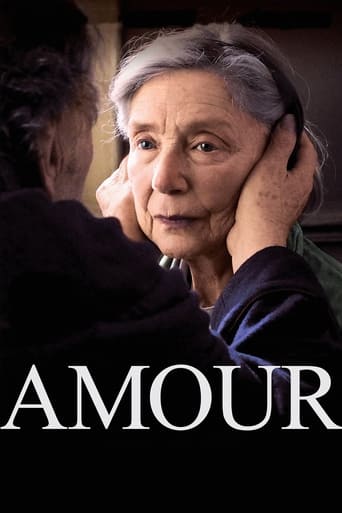

This is a beautiful movie, which picks up the story some decades after "happily ever after." People often talk about art being "universal." This is usually a cop out. All art is rooted in a culture, and books and movies make little sense if we don't come to them with the required knowledge. But if ever there was a universal movie, it was this one. Illness, death and love are part of everyone's experience. They are all fundamental parts of bodily experience, and transcend culture in a way that health, life and romance do not.The Taj Mahal looms over the Yamuna River in remembrance of Shah Jahan's lost love. "Amour" is a monument no less grand. The heart of the film is the relationship between Anne and Georges, who are played with consummate skill by Jean-Louis Trintignant and Emmanuelle Riva. I found Riva's performance particularly heartbreaking. It chimed with my own memories of similar situations, and her emotional course through the movie is as complex as it is heartbreaking.Haneke has a muted style. The camera is still, the soundtrack is bare, we continually see the same rooms and the same furniture from the same angles. This throws all the emphasis on the warm emotions of the principal characters. Their faces burn through the screen. Their words are crystal clear against a silent backdrop. The little details of Anne and Georges's home become familiar and take on lives of their own. The piano, the books, the kitchen table, the sink, the green chairs in the salon, the white cornices, the parquet floors. I don't think I've ever seen a movie before where I remember such things.It is a slow movie, but if you're not a fan of international art-house releases, this might be the one film you could handle. It is so warm and so real, that I think it really does have a universal appeal.***Having slept on it, I've changed my mind. I still think this is a beautiful movie. And I still think it is true to say that bodily illness is an almost uniquely universal theme.But it is not right to say that this movie is culturally universal. It is filled with contemporary, western themes to do with illness and dying. Should Anne be put into a home? Should she receive treatment? Is euthanasia justified? What responsibility do parents have for their children? What is the value of human life? How important is a person's dignity? How should we talk to and about the terminally ill? Perhaps many cultures pose similar questions, but surely none pose all of them in quite the way this movie does. This is one reason I found the movie so touching. It asked me questions I have asked myself about my own family members. Someone who had asked themselves different questions might not like the movie.Nor would people who find such questions distressing—as some of the other reviews show.My initial response to the movie reminds me of a scene in "The White Masai." Nina Hoss's character has just arrived with her husband, Jack Ido, in her new home among the Masai. She sees an old woman who has been abandoned to die, and tries to save her life. Neither the old woman nor anyone else sides with her. Euthanasia is not a question everywhere, but my strong response to "Amour" made me feel for a moment that it was. "I want more life," cries Roy Batty in the most famous scene of "Blade Runner." "Amour" brings this cry into question, in a beautiful, subtle, and undeniably Western way.
... View MoreI've always been an admirer of Haneke's work but this film left me cold. It is well made and the performances are terrific (especially Jean-Louis Trintignant); Haneke is certainly a master filmmaker whose formality certainly demands attention. Such is his hold on the viewer that the film doesn't really allow for self-reflection or moments when one might mourn the loss of their own loved ones. It is very tightly contained. I think it is best described as Disneyland for people who've never had to deal with end of life issues.As a gay man who came of age during the AIDS in the '80s, death was always a factor. I felt surrounded by it and supported friends and strangers alike who suffered and died. Even beyond that, I've supported friends who cared for parents who were in declining health and died. (Gay sons and daughters often assume these roles.) It is a honour to care for people and share the last stages of their lives with them. Death is inevitable for us all but it ain't over 'till it's over.Maybe that's why it seems like such an indulgence. We all have loved ones. The couple depicted, comparatively, suffer very little. The have a roof over their heads, groceries delivered daily, you never see them on the phone haggling with insurance companies; she receives the necessary care. On reflection, it seems that Haneke is indignant that we should die at all! To add some drama, he takes an unfair crack at the nursing profession which hardly seems representative in my experience.The whole thing was very unedifying. I was reminded of far superior films on this topic, most notably the 1993 documentary Silverlake Life which records the last months of a documentary filmmaker's harrowing life with AIDS, both the good and the bad days, and is a true celebration of life and love; Kirby Dick's Sick: The Life and Death of Bob Flanagan, Supermasochist (1997) is another startling record of long term illness and eventual death that manages to celebrate a difficult existence. These are films that truly look death in the face. Amour is just bourgeois old people in formalised decline with a nurse who brushed the old woman's hair too hard. For once, Haneke seems out of his depth; you almost wish the doorbell would ring and the film would lurch into a mashup of Funny Games and Amour. If someone videotaped it, you'd have Cache as well.Have been mystified by the across the board praise of this film. Are people really that distant from death?
... View MoreJust want to say, if "Mercy killing" was the idea, then there are better ways to kill someone than making them suffer like that. I just believe that he wasn't tired of seeing her suffer like that, but was tired of doing so much for her. He just needed to end his own suffering. The movie didn't make any sense to me at all. Boring, to say the least. 'Love' is a very big word and sure it has different representations and meanings for different people. But this movie was nowhere close to what we can call "love". Tell me one instant or one scene where you can picture or feel love? Highly disappointed with the movie. Very long too.
... View Morea film about love. precise, honest, cruel, more than realistic. two great actors in magnificent roles , exploring the sides and levels and challenges of love as only way to be yourself. a strange end. and delicate art, high science of detail of an unique director who recreates laws and gestures and essence of words in a film who broke limits and use a form of poetry of small things who has the status of profound challenge. a film about the other reflected in yourself. about lost and about hope. about small gestures and about the past. a new version of Philemon and Baucis. out of gods' visit, with the same evolution from the legend.
... View More